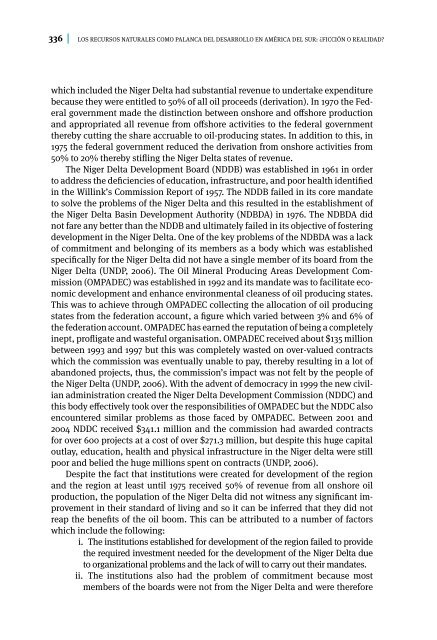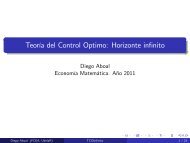- Page 2 and 3:
TÍTULOS DE LA SERIE RED MERCOSUR 1
- Page 4 and 5:
INSTITUCIONES MIEMBROS DE LA RED ME
- Page 6 and 7:
© RED MERCOSUR DE INVESTIGACIONES
- Page 8 and 9:
RESEÑAS DE AUTORES Diego Aboal (CI
- Page 10 and 11:
tualmente es Vice Ministro de Traba
- Page 12 and 13:
AGRADECIMIENTOS Este libro compila
- Page 14 and 15:
14 LOS RECURSOS NATURALES COMO PALA
- Page 16 and 17:
16 LOS RECURSOS NATURALES COMO PALA
- Page 18:
18 LOS RECURSOS NATURALES COMO PALA
- Page 23 and 24:
RED MERCOSUR 1.1. LOS RECURSOS NATU
- Page 25 and 26:
RED MERCOSUR guiado por las exporta
- Page 27 and 28:
RED MERCOSUR del fenómeno de la en
- Page 29 and 30:
RED MERCOSUR de factores (desde el
- Page 31 and 32:
RED MERCOSUR exportaciones conduce
- Page 33 and 34:
RED MERCOSUR bien estos trabajos no
- Page 35 and 36:
RED MERCOSUR del capital humano nec
- Page 37 and 38:
RED MERCOSUR concentración excesiv
- Page 39 and 40:
RED MERCOSUR zado en las regiones m
- Page 41 and 42:
RED MERCOSUR Gráfico 3. Investigad
- Page 43 and 44:
Cuadro 1. Patentes concedidas por U
- Page 45 and 46:
REFERENCIAS RED MERCOSUR Aditya, A.
- Page 47 and 48:
RED MERCOSUR Lederman, D. y Xu, L.
- Page 51 and 52:
RED MERCOSUR 1.2. LA ECONOMÍA POL
- Page 53 and 54:
Cuadro 1. Inflación y crecimiento
- Page 55 and 56:
RED MERCOSUR do para un funcionamie
- Page 57 and 58:
RED MERCOSUR En síntesis, el auge
- Page 59 and 60:
RED MERCOSUR En consecuencia, para
- Page 61 and 62:
RED MERCOSUR derechos de propiedad
- Page 63 and 64:
RED MERCOSUR hace que un abordaje s
- Page 65 and 66:
RED MERCOSUR La pregunta clave es,
- Page 67 and 68:
RED MERCOSUR Aunque el peso de lidi
- Page 69 and 70:
RED MERCOSUR debido a la mayor disp
- Page 71 and 72:
1.2.6. Países ricos en recursos na
- Page 73 and 74:
RED MERCOSUR a los máximos registr
- Page 75 and 76:
RED MERCOSUR precios unitarios), en
- Page 77 and 78:
RED MERCOSUR ción de la recaudaci
- Page 79 and 80:
RED MERCOSUR en nuestra región (v
- Page 81 and 82:
Cuadro 4. Resultado primario, resul
- Page 83 and 84:
RED MERCOSUR La evolución comparat
- Page 85 and 86:
RED MERCOSUR como de naturaleza cla
- Page 87 and 88:
RED MERCOSUR Cuadro 7. Variación d
- Page 89 and 90:
RED MERCOSUR hacerlo luego de permi
- Page 91 and 92:
RED MERCOSUR así, al final de cuen
- Page 93 and 94:
RED MERCOSUR productos básicos 38
- Page 95 and 96:
RED MERCOSUR Es deseable que la pol
- Page 97 and 98:
Bibliografía RED MERCOSUR Albrieu,
- Page 99 and 100:
RED MERCOSUR they a Curse? Are they
- Page 101 and 102:
RED MERCOSUR Gráfico 3. Saldo come
- Page 103:
Gráfico 5. Saldo comercial (bienes
- Page 106 and 107:
106 LOS RECURSOS NATURALES COMO PAL
- Page 108 and 109:
108 LOS RECURSOS NATURALES COMO PAL
- Page 110 and 111:
110 LOS RECURSOS NATURALES COMO PAL
- Page 112 and 113:
112 LOS RECURSOS NATURALES COMO PAL
- Page 114 and 115:
114 LOS RECURSOS NATURALES COMO PAL
- Page 116 and 117:
116 LOS RECURSOS NATURALES COMO PAL
- Page 118 and 119:
118 LOS RECURSOS NATURALES COMO PAL
- Page 120 and 121:
120 LOS RECURSOS NATURALES COMO PAL
- Page 122 and 123:
122 LOS RECURSOS NATURALES COMO PAL
- Page 124 and 125:
124 LOS RECURSOS NATURALES COMO PAL
- Page 126 and 127:
126 LOS RECURSOS NATURALES COMO PAL
- Page 128 and 129:
128 LOS RECURSOS NATURALES COMO PAL
- Page 130 and 131:
130 LOS RECURSOS NATURALES COMO PAL
- Page 132 and 133:
132 LOS RECURSOS NATURALES COMO PAL
- Page 134 and 135:
134 LOS RECURSOS NATURALES COMO PAL
- Page 136 and 137:
136 LOS RECURSOS NATURALES COMO PAL
- Page 138 and 139:
138 LOS RECURSOS NATURALES COMO PAL
- Page 140 and 141:
140 LOS RECURSOS NATURALES COMO PAL
- Page 142 and 143:
142 LOS RECURSOS NATURALES COMO PAL
- Page 144 and 145:
144 LOS RECURSOS NATURALES COMO PAL
- Page 146 and 147:
146 LOS RECURSOS NATURALES COMO PAL
- Page 148 and 149:
148 LOS RECURSOS NATURALES COMO PAL
- Page 150 and 151:
150 LOS RECURSOS NATURALES COMO PAL
- Page 152 and 153:
152 LOS RECURSOS NATURALES COMO PAL
- Page 155:
PARTE II ¿ENFERMEDAD HOLANDESA EN
- Page 158 and 159:
158 LOS RECURSOS NATURALES COMO PAL
- Page 160 and 161:
160 LOS RECURSOS NATURALES COMO PAL
- Page 162 and 163:
162 LOS RECURSOS NATURALES COMO PAL
- Page 164 and 165:
164 LOS RECURSOS NATURALES COMO PAL
- Page 166 and 167:
166 LOS RECURSOS NATURALES COMO PAL
- Page 168 and 169:
168 LOS RECURSOS NATURALES COMO PAL
- Page 170 and 171:
170 LOS RECURSOS NATURALES COMO PAL
- Page 172 and 173:
172 LOS RECURSOS NATURALES COMO PAL
- Page 174 and 175:
174 LOS RECURSOS NATURALES COMO PAL
- Page 176 and 177:
176 LOS RECURSOS NATURALES COMO PAL
- Page 178 and 179:
178 LOS RECURSOS NATURALES COMO PAL
- Page 180 and 181:
180 LOS RECURSOS NATURALES COMO PAL
- Page 182 and 183:
182 LOS RECURSOS NATURALES COMO PAL
- Page 184 and 185:
184 LOS RECURSOS NATURALES COMO PAL
- Page 186 and 187:
186 LOS RECURSOS NATURALES COMO PAL
- Page 188 and 189:
188 LOS RECURSOS NATURALES COMO PAL
- Page 190 and 191:
190 LOS RECURSOS NATURALES COMO PAL
- Page 192 and 193:
192 LOS RECURSOS NATURALES COMO PAL
- Page 194 and 195:
194 LOS RECURSOS NATURALES COMO PAL
- Page 196 and 197:
196 LOS RECURSOS NATURALES COMO PAL
- Page 198 and 199:
198 LOS RECURSOS NATURALES COMO PAL
- Page 200 and 201:
200 LOS RECURSOS NATURALES COMO PAL
- Page 203 and 204:
2.2. bRASIL E A DOENçA hOLANDESA r
- Page 205 and 206:
RED MERCOSUR 205 • O choque é pe
- Page 207 and 208:
RED MERCOSUR 207 De modo geral, pod
- Page 209 and 210:
(US$ mil) Kuwait Brunei Emirados Á
- Page 211 and 212:
RED MERCOSUR Gráfico 2. Participa
- Page 213 and 214:
RED MERCOSUR “as opções têm me
- Page 215 and 216:
RED MERCOSUR (338%) e nas demais de
- Page 217 and 218:
RED MERCOSUR O índice de rentabili
- Page 219 and 220:
RED MERCOSUR 219 Pode-se argumentar
- Page 221 and 222:
RED MERCOSUR Nos manufaturados, des
- Page 223 and 224:
RED MERCOSUR 223 Uma redução do c
- Page 225 and 226:
RED MERCOSUR 225 veis (70% do total
- Page 227 and 228:
RED MERCOSUR Assim como no Brasil,
- Page 229 and 230:
RED MERCOSUR 229 Em meados de 2011,
- Page 231 and 232:
RED MERCOSUR 231 período 2002-2006
- Page 233 and 234:
RED MERCOSUR 233 a criação de in
- Page 235 and 236:
Bibliografía RED MERCOSUR 235 Afon
- Page 237:
RED MERCOSUR 237
- Page 240 and 241:
240 LOS RECURSOS NATURALES COMO PAL
- Page 242 and 243:
242 LOS RECURSOS NATURALES COMO PAL
- Page 244 and 245:
244 LOS RECURSOS NATURALES COMO PAL
- Page 246 and 247:
246 LOS RECURSOS NATURALES COMO PAL
- Page 248 and 249:
248 LOS RECURSOS NATURALES COMO PAL
- Page 250 and 251:
250 LOS RECURSOS NATURALES COMO PAL
- Page 252 and 253:
252 LOS RECURSOS NATURALES COMO PAL
- Page 254 and 255:
254 LOS RECURSOS NATURALES COMO PAL
- Page 256 and 257:
256 LOS RECURSOS NATURALES COMO PAL
- Page 259:
PARTE III POLÍTICAS E INSTITUCIONE
- Page 262 and 263:
262 LOS RECURSOS NATURALES COMO PAL
- Page 264 and 265:
264 LOS RECURSOS NATURALES COMO PAL
- Page 266 and 267:
266 LOS RECURSOS NATURALES COMO PAL
- Page 268 and 269:
268 LOS RECURSOS NATURALES COMO PAL
- Page 270 and 271:
270 LOS RECURSOS NATURALES COMO PAL
- Page 272 and 273:
272 LOS RECURSOS NATURALES COMO PAL
- Page 274 and 275:
274 LOS RECURSOS NATURALES COMO PAL
- Page 276 and 277:
276 LOS RECURSOS NATURALES COMO PAL
- Page 278 and 279:
278 LOS RECURSOS NATURALES COMO PAL
- Page 280 and 281:
280 LOS RECURSOS NATURALES COMO PAL
- Page 282 and 283:
282 LOS RECURSOS NATURALES COMO PAL
- Page 284 and 285:
284 LOS RECURSOS NATURALES COMO PAL
- Page 286 and 287: 286 LOS RECURSOS NATURALES COMO PAL
- Page 288 and 289: 288 LOS RECURSOS NATURALES COMO PAL
- Page 291 and 292: Abstract RED MERCOSUR 3.2. OIl And
- Page 293 and 294: RED MERCOSUR 293 The two countries
- Page 295 and 296: Table 2: Colombia and Nigeria: Oil
- Page 297 and 298: Table 3: Macroeconomic Performance
- Page 299 and 300: RED MERCOSUR 299 The new scheme att
- Page 301 and 302: RED MERCOSUR 301 phase depend on th
- Page 303 and 304: Figure 5: Oil Reserves and Producti
- Page 305 and 306: RED MERCOSUR box 1: Evolution of Go
- Page 307 and 308: RED MERCOSUR 307 independence the r
- Page 309 and 310: RED MERCOSUR 309 In 1989 Government
- Page 311 and 312: RED MERCOSUR competition, evaluated
- Page 313 and 314: RED MERCOSUR Country Risk Guide (IC
- Page 315 and 316: RED MERCOSUR Figure 8: SVAR impulse
- Page 317 and 318: RED MERCOSUR Figure 10: SVAR impuls
- Page 319 and 320: Figure 12: SVAR impulse response to
- Page 321 and 322: RED MERCOSUR price shock occurs, wh
- Page 323 and 324: RED MERCOSUR Figure 15: Colombian N
- Page 325 and 326: Figure 18: Nigerian GDP Growth duri
- Page 327 and 328: RED MERCOSUR from observed values i
- Page 329 and 330: Figure 19: Oil and Gas Production T
- Page 331 and 332: Figure 22: Fiscal Revenues, Expendi
- Page 333 and 334: Figure 25: Transparency Index (aver
- Page 335: RED MERCOSUR 335 partments and find
- Page 339 and 340: RED MERCOSUR 339 ity of adverse cha
- Page 341 and 342: Table 3 Annex 1: Cross Country Inco
- Page 343 and 344: Table 5 Annex 2: OLS Estimation Res
- Page 345 and 346: Structural Vectors Autoregressive (
- Page 347 and 348: Variance Decomposition Results RED
- Page 349 and 350: RED MERCOSUR Table 7 Annex 2: Perce
- Page 353 and 354: EPÍLOGO RED MERCOSUR 353 De la man
- Page 355 and 356: RED MERCOSUR 355 adicionales a la a
- Page 357: RED MERCOSUR se descarga sobre regi



